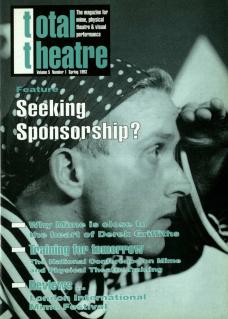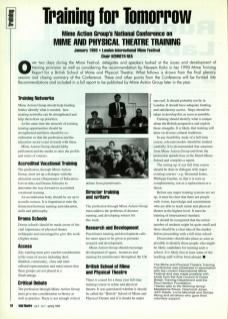Training Networks
Mime Action Group should help funding bodies identify what is needed, how training networks can be strengthened, and help them draw up priorities.
At the same time the network of existing training opportunities should be strengthened and there should be coordination so that the profession and the education sector is put in touch with these.
Mime Action Group should lobby parliament and the media to raise the profile and status of courses.
Accredited Vocational Training
The profession, through Mime Action Group, must set up a dialogue with the education sector (Department of Education, Universities and Drama Schools) to determine the way forward to accredited vocational training.
An accreditation body should be set up to accredit courses. It is important to note the distinction between training and education, skills and philosophy.
Drama Schools
Drama schools should be made aware of the vital importance of physical theatre techniques and encouraged to give this work a higher status.
Access
Any training must give careful consideration to the issue of access including deaf, disabled, community, class and intercultural representation, and must ensure that these groups are not placed at a disadvantage.
Critical Debate
The profession through Mime Action Group must give due consideration to theory as well as practice. There is not enough critical debate from practitioners.
Director training and writers
The profession through Mime Action Group must address the problems of director training, and developing writers for this work.
Research and Development
Practitioner training and development calls for more space to be given to promote research and development.
Mime Action Group should encourage development of space, resources and training for practitioners throughout the UK.
British School of Mime and Physical Theatre
There is a need for a three-year full-time training course in mime and physical theatre. It was questioned whether it should be called the ‘British’ School of Mime and Physical Theatre and if it should be under one roof. It should probably not be in London. It should have adequate funding, and satisfactory access. Steps should be taken to develop this as soon as possible.
Training should identify what is unique about the British perspective and exploit these strengths. It is likely that training will draw on diverse cultural traditions.
In any feasibility study of a full-time course, relevant models should be studied carefully. It is recommended that someone from Mime Action Group and from the profession spends time at the Dutch Mime School and compiles a report.
The setting up of any full time course should be done in dialogue with major existing courses – e.g, Desmond Jones, Philippe Gaulier – so that it is seen as complimentary, not as a replacement or a threat.
Before any major training systems are set up, it must be clear that there are people with vision, knowledge and commitment who are able to teach mime and physical theatre at the highest level. It must be training of international standard.
It should be recognised that the initial number of students might be quite small and there should be a clear idea of the market before proceeding with a full-time school.
Discussions should take place as soon as possible to identify those people who might be likely candidates for running such a school. It is likely that at least some of the teaching staff will be from abroad.
The Mime and Physical Theatre Training Conference was presented in association with the London International Mime Festival and was made possible with funds from the Arts Council of Great Britain Training Department and the Paul Hamlyn Foundation. Thanks also to the Working Group: Magdalene Elwes, Desmond Jones, John Keefe, Lorna Marshall and Denise Wong, and all others who gave their voluntary support.

